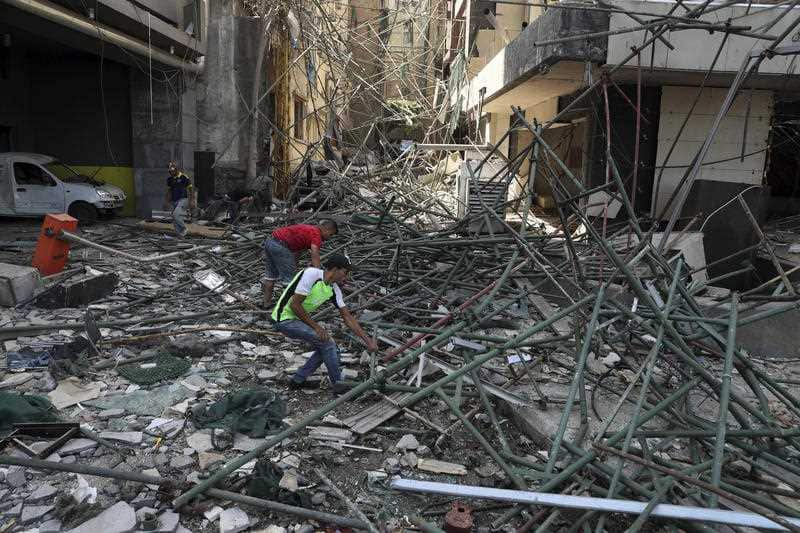Lebanon mourned on Thursday the victims of the most powerful blast to hit the country that was already being crushed by an economic crisis, as rescuers searched for those missing since the explosion that flattened Beirut port and devastated the city.
French President Emmanuel Macron, making the first visit by a foreign leader since Tuesday’s blast which killed at least 137 people and injured 5,000, also arrived in Beirut on Thursday along with specialist rescue personnel and equipment.
Dozens are missing and up to a quarter of a million people were left without homes fit to live in after shockwaves smashed building facades, sucked furniture out into streets and shattered windows miles inland.
Officials expect the death toll to rise as rescue workers comb through the rubble.
Prime Minister Hassan Diab declared three days of mourning from Thursday for victims of the explosion, the most devastating ever to hit the city that is still scarred by civil war three decades ago and reeling from a financial meltdown and surge in coronavirus cases.
Officials have blamed the disaster on a huge stockpile of highly explosive material held for years at the port in unsafe conditions. The government has ordered port officials to be put under house arrest, ministerial sources told Reuters.
Even as they counted their dead and cleaned up the streets, many Lebanese were boiling with anger over a blast they see as the most shocking expression yet of their leadership's incompetence and corruption.
"We can't bear more than this. This is it. The whole system has got to go," said 30-year-old Mohammad Suyur as he picked up broken glass in Mar Mikhail, one of the most affected districts in Beirut. Many questions were being asked as to how such a huge cargo of highly explosive material could have been left unsecured in Beirut for years.
Many questions were being asked as to how such a huge cargo of highly explosive material could have been left unsecured in Beirut for years.

Workers remove rubble from damaged buildings near the site of an explosion on Tuesday that hit the seaport of Beirut, Lebanon, Thursday, Aug. 6, 2020 Source: AP
Mr Diab and President Michel Aoun promised to put the culprits behind bars but trust in institutions is low and few on the streets of the Lebanese capital held out any hope of an impartial inquiry.
Human Rights Watch on Thursday supported mounting calls for an international probe as the only credible option.
"An independent investigation with international experts is the best guarantee that victims of the explosion will get the justice they deserve," the watchdog said.
Some local media reported sightings of drones or planes flying in the area shortly before the explosion and some Beirut residents said they saw missiles fired. But officials have denied the incident was the result of an attack.
A Lebanese security source said the initial blaze that sparked the explosion was caused by welding work.
White House Chief of Staff Mark Meadows said the US government had not ruled out the possibility that Tuesday’s explosion was an attack and was still gathering intelligence.
People who felt the explosive force said they had witnessed nothing comparable in years of conflict and upheaval in Beirut, which was devastated by the 1975-1990 civil war and since then has experienced big bomb attacks, unrest and a war with Israel.
“First we heard one sound. Seconds later there was a big explosion. All hell broke loose,” said Ibrahim Zoobi, who works near the port. “I saw people thrown five or six metres.”
He said those in the port district “were burned or charred”.
Health officials reported that hospitals were running out of beds and equipment to attend to the injured.
Operations have been paralysed at Beirut port, Lebanon’s main route for imports needed to feed a nation of more than 6 million people, forcing ships to be diverted to smaller ports.
The World Bank said on Wednesday it would work with Lebanon’s partners to mobilise public and private financing for reconstruction and recovery. But it was unclear what impact this would have on the country difficult negotiations with the International Monetary Fund.
Readers seeking support with mental health can contact Beyond Blue on 1300 22 4636. More information is available at . supports people from culturally and linguistically diverse backgrounds.
With AFP.



